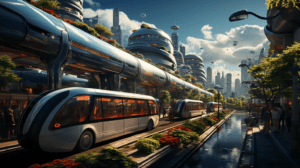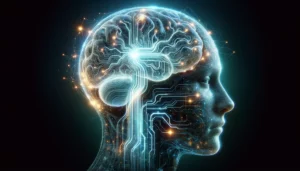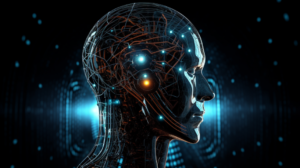I never thought I’d see the day when machines could think for themselves. But here we are, in the midst of the rise of Artificial Intelligence. It’s like something out of a sci-fi movie, except it’s real life.
Every day, AI is becoming more and more integrated into our lives. From voice assistants like Siri and Alexa, to self-driving cars and smart homes, AI is changing the way we live and work. It’s both exciting and a little bit scary, to be honest. But one thing’s for sure, the future is here, and it’s powered by Artificial Intelligence.
The Growth of AI in Various Industries

As a tech enthusiast, I’ve witnessed the rise of artificial intelligence firsthand. It’s like watching a sci-fi movie come to life, with machines taking over tasks and making our lives easier. The efficiency and speed at which AI operates is mind-blowing, and it’s only getting better.
From self-driving cars to virtual assistants, AI has infiltrated various industries, revolutionizing processes and pushing boundaries. It’s like having a personal assistant who never gets tired or makes mistakes. The growth of AI has been remarkable, and I can’t wait to see what the future holds.
One industry that has seen significant advancements in AI is agriculture. AI technologies are being used to optimize farming practices, improve crop yield, and reduce resource wastage. For example, AI-powered drones and robots can monitor crops, detect diseases, and apply targeted treatments, leading to increased productivity and reduced environmental impact.
Additionally, AI is also making its mark in the manufacturing sector. AI applications in manufacturing include predictive maintenance, quality control, and supply chain optimization. Smart machines powered by AI can identify potential issues before they occur, ensuring minimal downtime and improved product quality.
Furthermore, AI systems can analyze large volumes of data to optimize production schedules, minimize waste, and streamline operations. The integration of AI in agriculture and manufacturing is paving the way for more sustainable and efficient practices in these industries.
The Rise Of Artificial Intelligence Impact of AI on Transportation and Autonomous Vehicles

AI has had a significant impact on transportation and autonomous vehicles, revolutionizing the way we travel and navigate our roads.
One of the key benefits of AI in transportation is its impact on traffic congestion. By using real-time data and predictive analytics, AI can optimize traffic flow and reduce congestion on our roads. It can analyze patterns, adjust traffic signals, and suggest alternative routes to drivers, leading to more efficient travel times.
Moreover, AI plays a crucial role in improving road safety. It can detect potential hazards, such as pedestrians or obstacles, and alert drivers in advance. Additionally, AI-powered autonomous vehicles have the potential to eliminate human error, which is a leading cause of accidents.
With AI’s continuous advancements, we can expect further improvements in traffic management and road safety in the future.
Revolutionizing Healthcare With AI

Artificial intelligence has the potential to revolutionize healthcare by transforming the way medical professionals diagnose and treat diseases. The applications of AI in healthcare are vast, and two notable areas where AI is making significant strides are in drug discovery and AI-powered robotic surgery.
- Applications of AI in drug discovery: AI algorithms can analyze vast amounts of data to identify patterns and potential drug candidates. This technology can speed up the drug development process, leading to the discovery of new treatments and therapies for various diseases.
- AI-powered robotic surgery: AI technology is being integrated into surgical robots, enabling more precise and minimally invasive procedures. These robots can analyze real-time data during surgery and assist surgeons in making more accurate decisions, resulting in improved outcomes for patients.
The integration of AI in healthcare holds immense potential for improving patient care, reducing costs, and advancing medical research. With continued advancements, AI is poised to transform the healthcare industry in the coming years.
Enhancing Customer Service With AI Technologies
Improving customer service can be achieved by harnessing the power of AI technologies. AI-powered virtual assistants and chatbots have become increasingly popular in customer service, providing real-time assistance and support to customers. These AI-driven systems can handle a wide range of inquiries, reducing the need for human intervention and improving response time.
Additionally, AI can enhance the customer experience in e-commerce through personalized recommendations and tailored product suggestions. By analyzing customer data and preferences, AI algorithms can generate accurate and targeted recommendations, increasing customer satisfaction and driving sales. The following table demonstrates some of the key AI technologies and their applications in customer service:
| AI Technology | Application in Customer Service |
|---|---|
| Virtual Assistants | Providing real-time assistance and support to customers |
| Chatbots | Handling a wide range of customer inquiries |
| Personalization Systems | Generating personalized recommendations in e-commerce |
| Recommendation Systems | Offering tailored product suggestions to customers |
| Natural Language Processing | Understanding and responding to customer queries |
AI’s Role in Finance and Risk Assessment
With its ability to analyze vast amounts of data and identify patterns, coupled with its potential to predict market trends, artificial intelligence has become a pivotal tool in finance and risk assessment.
AI’s role in financial fraud detection has significantly improved the ability of financial institutions to identify and prevent fraudulent activities. By using advanced algorithms and machine learning techniques, AI can detect suspicious patterns and anomalies in financial transactions, helping to safeguard against fraudulent activities.
Additionally, AI has had a profound impact on credit scoring. By analyzing a wide range of data points, including credit history, income, and spending habits, AI-powered credit scoring models can provide more accurate assessments of an individual’s creditworthiness, enabling lenders to make informed decisions and mitigate risks.
Addressing Ethical Concerns in AI Development
To ensure responsible and equitable AI development, it is essential to address ethical concerns and implement robust frameworks and guidelines. The rapid advancement of artificial intelligence has raised significant ethical implications, particularly in the areas of data privacy and protection. As AI systems rely heavily on large amounts of data, there is a risk of breaching individuals’ privacy rights and exposing sensitive information.
To mitigate these concerns, organizations must prioritize data privacy by implementing strict data governance practices, ensuring transparency in data collection and usage, and obtaining informed consent from individuals. Additionally, ethical guidelines should be established to govern the design, development, and deployment of AI systems, addressing issues such as algorithmic bias, accountability, and potential societal impacts.
| Ethical Concerns in AI Development | Frameworks and Guidelines |
|---|---|
| Data privacy | Strict data governance |
| Algorithmic bias | Transparent practices |
| Accountability | Informed consent |
| Societal impacts | Ethical guidelines |
Job Displacement and Bias in AI Algorithms
Frequently overlooked in discussions about the spectacular surge of artificial intelligence are the concerns surrounding job displacement and the potential biases present in AI algorithms. As AI continues to advance, there is growing apprehension about the impact it will have on the workforce. Here are three key points to consider:
- Job Displacement: AI has the potential to automate tasks traditionally performed by humans, leading to job losses in certain industries. This raises concerns about unemployment and the need for retraining programs to ensure a smooth transition.
- Bias in AI Algorithms: AI algorithms are trained on data that may contain biases, which can result in unfair outcomes. It is crucial to address and mitigate these biases to ensure fairness in decision-making processes and avoid perpetuating discrimination.
- Fairness in AI Algorithms: Ensuring fairness in AI algorithms requires transparency and accountability. Developers must actively work towards eliminating biases and creating algorithms that treat all individuals equally, regardless of their race, gender, or other characteristics.
Overcoming Challenges in AI Implementation
The successful implementation of artificial intelligence (AI) requires overcoming various challenges that arise during the development and deployment processes.
One of the major challenges is scalability. As AI applications become more complex and handle larger amounts of data, ensuring that the system can scale effectively becomes crucial. This includes addressing issues related to processing power, memory, and storage, as well as optimizing algorithms to handle the increased workload.
Another challenge is the ethical implications of AI implementation. As AI systems become more autonomous and decision-making, concerns arise regarding privacy, bias, and accountability. It is important to establish ethical guidelines and regulations to ensure that AI is deployed in a responsible and fair manner.
Additionally, transparency and explainability of AI algorithms are important to build trust and address potential biases or discriminatory outcomes.
Overcoming these challenges will be essential for the successful and responsible implementation of AI.
With the rise of artificial intelligence, we’re witnessing a future that is both exciting and transformative
Advancements in artificial intelligence (AI) research and development, coupled with the integration of AI technologies with other emerging technologies, have paved the way for an exhilarating future in various sectors. The future of AI holds immense potential in transforming education and learning.
- AI’s impact on education and learning:
- AI-powered virtual tutors and personalized learning platforms can provide individualized instruction to students, catering to their unique needs and learning styles.
- Intelligent assessment systems can analyze student performance and provide real-time feedback, enabling educators to identify areas of improvement and tailor their teaching strategies accordingly.
- AI can automate administrative tasks, freeing up valuable time for educators to focus on innovative teaching methods and personalized instruction.
Moreover, AI is set to revolutionize the entertainment and media industry.
- The role of AI in the entertainment and media industry:
- AI algorithms can analyze user preferences and behavior to recommend personalized content, enhancing user experience and engagement.
- AI-powered chatbots and virtual assistants can interact with audiences, providing immersive and interactive experiences.
- AI can automate content creation processes, generating personalized stories, music, and videos, revolutionizing the creative process.
Frequently Asked Questions
What Are the Key Technologies Used in Artificial Intelligence?
The key technologies used in artificial intelligence (AI) include machine learning and natural language processing.
Machine learning algorithms enable AI systems to learn from data and improve their performance over time.
Natural language processing allows AI systems to understand and interpret human language, enabling tasks such as speech recognition and language translation.
These technologies form the foundation of AI and play a crucial role in enabling machines to perform tasks that typically require human intelligence.
How Does AI Improve Safety in Different Industries?
AI improves safety in different industries by leveraging advanced technologies to detect and predict potential risks.
In transportation, autonomous vehicles equipped with AI algorithms can analyze real-time data to enhance safety and efficiency on the roads.
In healthcare, AI systems can assist in disease diagnosis and drug discovery, reducing errors and improving patient safety.
What Are the Potential Benefits of AI in Scientific Research?
In scientific research, AI has the potential to bring about improved discoveries and enhanced efficiency.
AI algorithms can analyze vast amounts of data and identify patterns that humans may overlook, leading to new insights and breakthroughs.
Machine learning techniques can also help researchers process and interpret complex data sets more quickly and accurately.
What Are the Ethical Concerns Associated With Ai?
Privacy concerns and job displacement are two significant ethical concerns associated with AI.
As AI systems collect and analyze vast amounts of personal data, there is a risk of privacy breaches and misuse of information.
Additionally, AI’s automation capabilities may lead to job displacement and unemployment in various industries, challenging the livelihoods of many individuals.
Addressing these concerns requires robust regulations and ethical frameworks to ensure the responsible and fair use of AI technology.
How Is AI Expected to Integrate With Other Emerging Technologies in the Future?
AI is expected to integrate with other emerging technologies in the future, including blockchain and the Internet of Things (IoT).
The integration of AI and blockchain can enhance security and transparency in various industries, such as supply chain management and financial transactions.
AI and IoT integration can enable smart and connected devices to collect and analyze data, leading to improved automation and efficiency in sectors like healthcare and manufacturing.
This integration has the potential to revolutionize industries and transform the way we live and work.
Conclusion
I’ve seen it all. The rise of artificial intelligence, the potential it holds, and the challenges it brings. From self-driving cars to healthcare advancements, the rise of artificial intelligence is changing everything. But we can’t ignore the ethical concerns and job displacement.
But with great power comes great responsibility. We must address ethical concerns, job displacement, and biases to ensure responsible development. Yet, despite the challenges, the future of AI is bright. Imagine AI-powered virtual assistants revolutionizing education, adapting to individual needs. It’s a world where personalized learning becomes the norm, and the potential is limitless.
We must ensure responsible development and address algorithmic biases. It’s a delicate balance, but the future of AI is bright. Imagine AI-powered virtual assistants revolutionizing education, adapting to individual needs. It’s a world where personalized learning becomes the norm, and the possibilities are endless.



